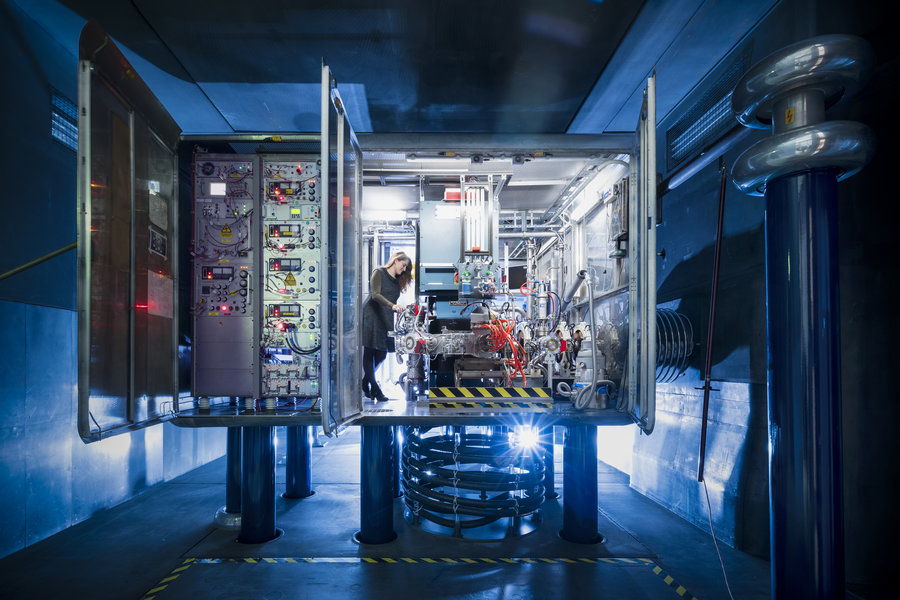Helmholtz Academy for research at the particle accelerator FAIR founded
04.10.2021 |
This text is based on a press release by the Hessian Ministry of Higher Education, Research, Science and the Arts
The Hessian Ministry of Higher Education, Research, Science and the Arts has approved the foundation of a research academy to further the involvement of Hessian universities in the FAIR particle accelerator and will fund it with three million euros per year. The new Helmholtz Research Academy Hesse for FAIR (HFHF), with three locations in Darmstadt, Frankfurt and Giessen, will support FAIR-focused science at Technical University of Darmstadt, Goethe University Frankfurt and Justus Liebig University Giessen.
“With FAIR, a globally unique facility is being built that is also of outstanding importance for the Hessian research landscape,” explains Hesse's Science Minister Angela Dorn. “With the particle accelerator, it will be possible to investigate the structure of matter and the development of the Universe from the Big Bang to the present. The topics range from fundamental knowledge to the development of novel applications for technology and medicine. Hesse's universities are to play a leading role in this. The bright minds of tomorrow will also benefit from this source of knowledge — Hesse's young scientists and students. This is why we are establishing the Helmholtz Research Academy Hessen for FAIR.”
The international large research facility FAIR (Facility for Antiproton and Ion Research) is being built as a non-university research facility next to the site of the GSI Helmholtzzentrum für Schwerionenforschung in Darmstadt. As an institution spanning across universities, the research academy is to expand the expertise in the FAIR research areas available at the three universities and the Frankfurt Institute for Advanced Studies (FIAS), and establish it in the long term. The state has already supported FAIR-oriented research at the universities within the framework of the LOEWE Excellence Initiative, thus enabling the establishment of around 30 new professorships. The HFHF is now mainly dedicated to promoting talented young researchers.
“As FAIR promises world-class research for several decades, it is essential to attract and nurture the best young scientists today in order to make the most of these long-term opportunities. The Research Academy enables us to achieve this goal at the universities and to play a leading role in FAIR research,” emphasizes Professor Dr. Dr.-Ing. Peter Kämpfer, spokesperson of the HFHF Board and Vice President for Research and Graduate Studies at the Justus Liebig University in Gießen.
The scientific orientation of the HFHF is coordinated by eight directors who hold professorships at HFHF partner universities and are internationally renowned experts in the various research fields of FAIR. The Managing Director of the Research Academy, Professor Dr. Dr. h. c. Marcus Bleicher of Goethe University Frankfurt, sees the new institution as a unique opportunity: “The funding of the Research Academy will allow me and my colleagues at the partner institutions to conduct long-term FAIR-oriented research at a high international level and to play a leading role in the various FAIR research areas.”
An international evaluation committee reviewed HFHF's research plan for 2021 to 2025 very favorably and recommended it for implementation. “In the expert panel, we were very impressed with the research plan that was submitted to us for evaluation. On this basis, the research academy will be able to achieve excellent scientific results and secure a leading role for the Hessian universities in FAIR research,” says Professor Karl-Heinz Kampert, astroparticle physicist at the University of Wuppertal and chairman of the evaluation committee, summarizing the result.
The three universities participating in the research academy contribute a total of 5 million euros annually to the academic endowment of the HFHF. “The promotion of excellent young scientists and the cooperation with GSI is worth it to us,” emphasizes Professor Dr. Barbara Albert, Vice President for Research and Early Careers at the TU Darmstadt.
GSI flanks the funding via bilateral collaborations with research groups of the partner universities and FIAS in the financial scope of 3 million euros per year also. “GSI and later FAIR as well as our Hessian partners will benefit greatly from continuing this tradition in the long term. It is essential for our center not only to enable cutting-edge research, but also to inspire young scientists for this research. We have succeeded through our close cooperation with the universities. HFHF will not only continue this tradition, but also expand it further, for the benefit of research in general, but above all to secure Hesse as a location for science,” enthuses Professor Dr. Dr. h.c. mult. Paolo Giubellino, Scientific Managing Director of GSI and FAIR and Professor of Nuclear Physics at the TU Darmstadt. (HMWK/BP)
Further information
The Helmholtz Research Academy Hesse for FAIR
Press release by the Hessian Ministry of Higher Education, Research, Science and the Arts












